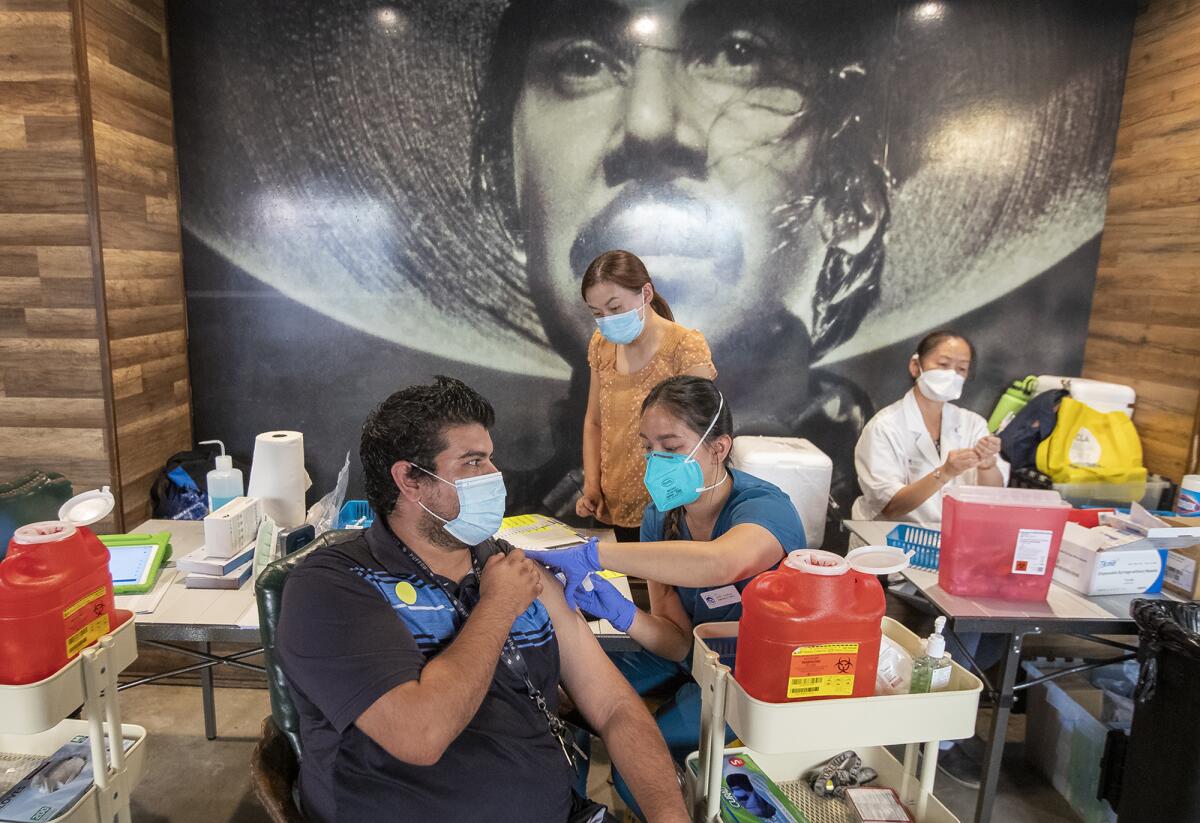Commentary: Why bother to get vaccinated?

- Share via
No one thinks they will get a severe case of COVID-19 until they get it. To that end, more people died from COVID-19 in the United States during just the last week of August than died during the 9/11 attacks, and more than 5,000 Orange County residents have died from COVID-19 since the start of the pandemic. Just a week earlier, the Food and Drug Administration granted formal approval to Pfizer/BioNTech’s COVID-19 vaccine, Comirnaty. Similar approval for Moderna’s vaccine is coming shortly and booster shots are on the horizon. Vaccines are the best protection against getting the disease and spreading it, so why isn’t everyone getting vaccinated?
With improving vaccination numbers, life was beginning to feel more normal as summer began. Unfortunately, the numbers weren’t enough to stop the Delta variant. As we head into the winter months with an unpredictable flu season, some people are questioning why bother to get vaccinated if there are breakthrough infections? The simple answer is that the vaccine saves lives! Breakthrough infections have a dramatically lower likelihood of leading to hospitalization or death compared to infections in unvaccinated people.
Beyond the fact that the vaccine is the best protection you have if you are exposed to COVID-19, deciding to remain unvaccinated has a number of other drawbacks. Across the country, state and local governments have developed ordinances that will require proof of vaccination to enjoy a few activities. These new ordinances restrict indoor spaces to use by vaccinated people only and include bars, restaurants, spas and fitness centers, retail stores, concerts, sporting events and movie theatres. The federal government is implementing vaccine requirements for all businesses with more than 100 employees and new requirements for federal employees and contractors.
In California, by order of the Department of Public Health, all indoor events with more than 1,000 attendees must require proof of vaccination or a negative COVID test. Without a vaccine it is harder to travel internationally, with dwindling options for the unvaccinated. And schools are beginning to implement vaccination requirements — all L.A. Unified School District students 12 and older must be fully vaccinated by January. This action will help keep our schools open, with students and teachers in the classroom.
In addition to preventing the risk of severe illness, including hospitalization and death, vaccines also prevent the long-lasting problems related to COVID-19. Many formerly infected COVID-19 patients report lingering fatigue, intermittent fever, shortness of breath, cough, joint pain, muscle pain, headache, chest pain, a “brain fog” which includes difficulty thinking and concentrating, and depression. In addition, many recovered COVID-19 patients report health issues with their heart, lung, kidney, skin, teeth and nervous system after infection with the coronavirus.
Friday is Suicide Prevention Day, the chief executive officer of Waymakers in Orange County writes. In Orange County, 11 young people took their lives in 2020.
However, let’s focus on the good news. The vaccine is safe, effective and officially approved. Thanks to emergency use authorization, 350 million mRNA doses had already been given in the United States and more than a billion doses worldwide. In Orange County, more than 1.8 million residents are fully vaccinated and more than 200,000 are awaiting their second dose. What followed those vaccine rollouts was a dramatic decrease in the spread of the virus, and no red flags regarding vaccine safety.
If you are pregnant or considering becoming pregnant, it is especially crucial that you receive the vaccine. COVID-19 illness can be more severe in pregnancy. On the bright side, COVID-19 vaccines are safe for pregnant women and recommended by the CDC for all women who are pregnant, considering becoming pregnant or breastfeeding. Importantly, the vaccine protects unborn children by allowing mothers to pass along immunity to the SARS-CoV-2 virus.
By getting the vaccine, you are also protecting the most vulnerable including those whose immune systems are not strong enough to battle COVID-19. This means if you come into contact with an unvaccinated child battling cancer, you are much less likely to expose them to a virus they just can’t fight.
We all want this pandemic to end. The best way to achieve this is for 75 to 85% of the population to be vaccinated. If we don’t achieve this level of vaccination the virus will evolve and continue to spread. The high spread of COVID-19 cases allows the virus to grow and mutate into stronger variants like the Delta variant. In just over five weeks, the Delta variant became responsible for 95% of COVID-19 cases across the United States. The Delta variant is twice as contagious and capable of producing more severe illness. It’s a reminder that we must do all that we can to stop this pandemic.
With a highly contagious disease, our actions affect those around us. We must encourage everyone to be fully vaccinated to protect ourselves, our friends, our loved ones and our society.
Dr. Michael J. Stamos is the dean of the UC Irvine School of Medicine.
All the latest on Orange County from Orange County.
Get our free TimesOC newsletter.
You may occasionally receive promotional content from the Daily Pilot.




